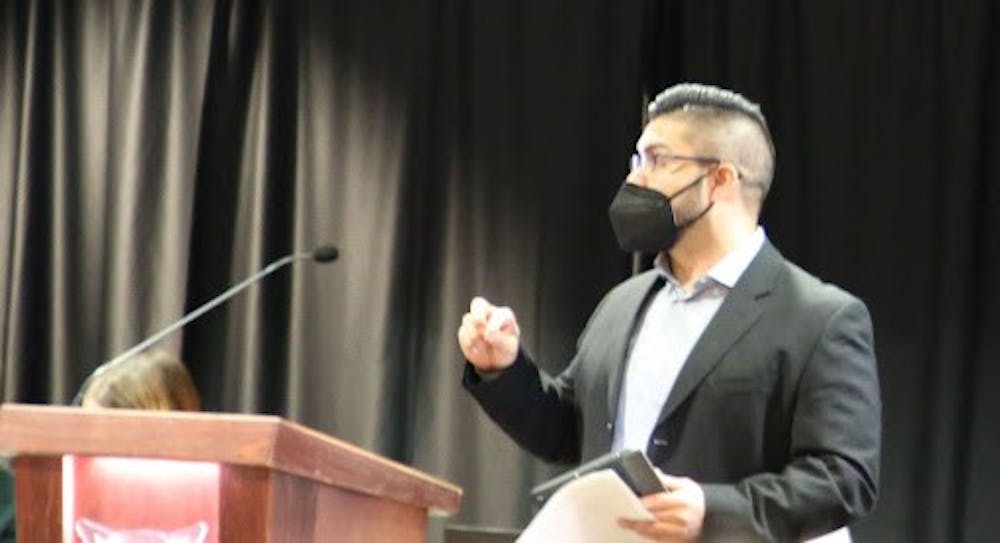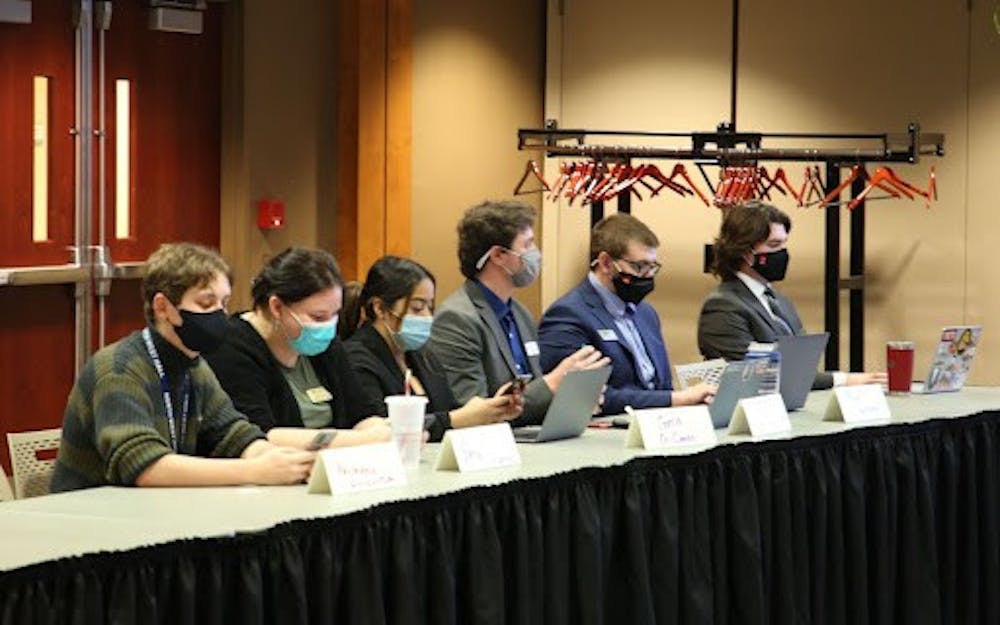Ball State’s Student Government Association (SGA) voted on four amendments and proposed two amedments Feb. 9.
The meeting started with a special guest, Second-Year Doctoral Student Micheal Martinez, who asked for SGA’s support in developing representation for graduate students separate from SGA.
“The needs of graduate students are different than undergrad students. Many of us have had careers. Many of us have families,” Martinez said. “ Many of us are full-time employees, we have full-time jobs. And then we go to graduate school at night, on top of family and other commitments.”
After his meeting with SGA, Martinez along with his co-founder Jeffry Neuhouser will set up a date to speak with the University Senate. There will also be a town hall to garner support and to involve other departments Feb. 23.
“We are also in the process of developing our own constitution and the structuring of our governance within the SGA,” Martinez said.
Ball State has 25 governance committees. In those committees, there are 20 positions that can be filled strictly by graduate students and 23 positions that can be filled by either a graduate or an undergraduate student.
Martinez said currently eight of the 20 graduate positions have been filled, and eight of the 23 graduate or undergraduate positions have been filled — four of which are filled by undergraduate students.
“There’s zero representation in university government for graduate students,” Martinez said.

Guest speaker Michael Martinez, a Ball State doctoral student, speaks to the Ball State Student Government Association Feb. 9. Martinez spoke about starting a graduate Student Government Association. Richard Kann, DN
RELATED: Ball State SGA passes minimum wage resolution, now to be reviewed by University Senate
SGA President Tina Nguyen gave an update to SGA about the minimum wage resolution that was passed by SGA Dec. 8. The resolution was sent to the University Senate to be reviewed.
“There’s a working group looking at campus employment in a holistic way,” Nguyen said.
Senators introduced two amendments that proposed changes to the executive cabinet and standardized requirements for the Collegiate Caucus.
The first amendment was aimed at the executive cabinet and proposed to eliminate the archivist position. The amendment noted that the position of archivist has produced “mixed results” over the past few years.
The amendment states, “over time, the Parliamentarian, and by extension the Rules and Constitution Committee, has had to pick up the slack.”
Removing the position would allow the responsibilities of archivist to be fully redistributed to the Parliamentarian and the Rules and Constitution Committee.
The second amendment proposed to standardize Collegiate Caucus requirements in response to signature requirements for applicants being removed. This amendment would allow applicants who wish to represent their college to avoid going through the Credentials Board upon meeting certain requirements.
The requirements would be letters of recommendation, verified by the President Pro Tempore, from the dean of their college and two additional faculty members in the college.
Currently, the Teachers College is not recognized as part of the Collegiate Caucus. The amendment would remove the College of Applied Sciences and Technology from the Collegiate Caucus and replace it with the Teachers College.
According to the SGA parliamentarian, the current and legitimate representative for the Teachers College is Senator Sarah Owens.
Both introduced amendments will be voted at the next meeting Feb. 16.
RELATED: Ball State SGA introduces an amendment to increase On-Campus representation
SGA voted on four amendments that were proposed Feb. 2.
The first amendment proposed to increase the On-Campus Caucus by four seats. The amendment proposes each residence hall having one representative, instead of the current rule of each housing establishment having one representative.
The amendment passed 26-0 with one abstention.
The second amendment proposed to have a minimum requirement of 150 student signatures for resolutions.
“This amendment here, unfortunately, isn’t practical. The minimum wage resolution only received 141 signatures, after weeks of effort by all the authors, including visits to [organizations] and classes, and yet, we all know that that is a measure that most students want,”Senator Brenna Large said. “This just isn’t practical for most senators. It’s going to discourage the resolutions of students.”
The amendment failed 2-20 with five abstentions.
The third amendment proposed to update the language surrounding the Residence Hall Association (RHA) representative in order to better reflect their position as a voting member of the student senate.
“The language surrounding the RHA representative was not updated concurrently to reflect their status as a voting member, and the RHA representative should not continue to be further restricted as a voting member of this body” according to the amendment.
The amendment passed 24-0 with three abstentions.
The fourth amendment proposed lowering the number of signatures required to present a bill of impeachment. The requirement of one-third of the voting members of the Student Senate to call for an investigation into a member of SGA would be reduced to one-third.
The amendment passed 25-0.
Contact Hannah Amos with comments at hannah.amos@bsu.edu or on Twitter @Hannah_Amos_394. Contact Richard Kann with comments at richard.kann@bsu.edu or on Twitter @RichardKann.





